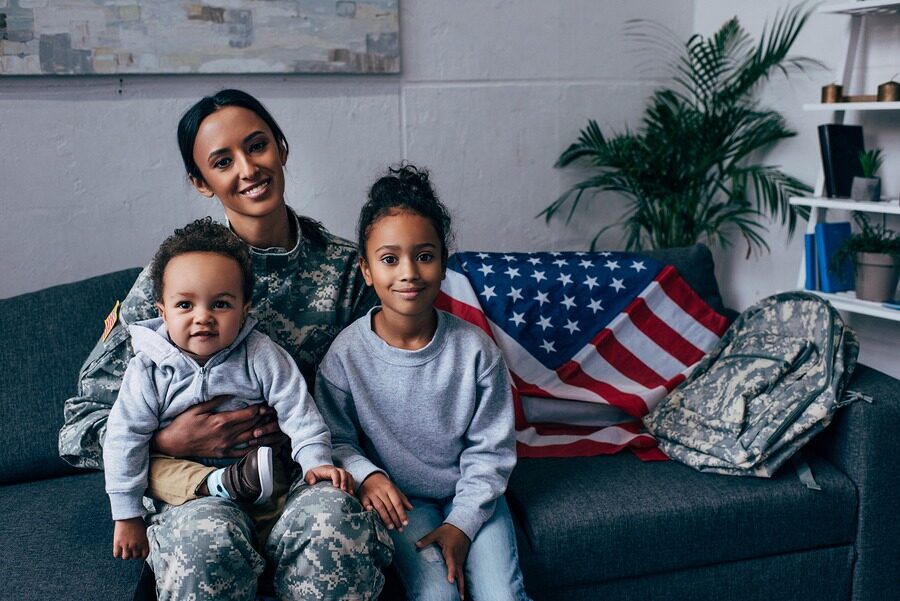
Active duty military service members, as well as their families, make large sacrifices in service to their country. The long separations, frequent relocations, and the challenges of active duty may stress and take a toll on these marriages. A Virginia military divorce creates several unique issues as compared to the typical civilian divorce and can be impacted by both state and federal laws.
While all divorces, both military and civilian, in the Commonwealth of Virginia, are governed by Virginia law there are benefits and unique circumstances that pertain exclusively to a military divorce. For that reason, it is important that anyone in a military family seeking a divorce consult with a Virginia divorce attorney with experience handling military divorces.
Residency Requirements:
In Virginia, the grounds for a military divorce are the same as for a civilian divorce.
Military divorce filing requirements are as follows:
- You or your spouse must reside in Virginia
- You or your spouse must be stationed in Virginia
To establish residency, Virginia requires one or both spouses to live in Virginia for at least six months, with the intention of staying indefinitely, before they can file for divorce. But the Commonwealth makes a specific exception to the “domicile” requirement for those serving in the military. A service member meets the residency requirement as long as he/she has been stationed in Virginia for at least six months, regardless of their intent to stay.
Schedule your free meeting with our team today to see if our Lawyers can help you.
Default Judgments:
Federal law protects active military members from being held in default when they are on duty and therefore cannot or fail to respond to a divorce action. These laws were enacted to protect active military from being divorced without knowing it. In Virginia, an active duty service member must be served in person. In an uncontested case, the active duty spouse may not have to be served as long as he or she signs and files a waiver affidavit acknowledging the divorce action.
Under the Soldiers and Sailors Civil Relief Act, 50 UCS section 521 and in the discretion of the local Virginia court, the divorce proceeding may be postponed for the entire time the active service member is on duty and for up to 60 days thereafter. This is typically the case when the active member is serving in a war. However, the right to have the divorce proceedings postponed can be waived by any active duty member should he or she wish to get the divorce.
Child support and spousal support:
Military spouses are often forced to delay career opportunities and education to focus on their families, leaving them jobless or under-employed. For this reason, child and spousal support are a major concern for divorcing military families.
In Virginia, both child support and spousal support awards may not exceed 60% of a military member’s pay and allowances (housing, hazard pay, bonuses, and non-monetary compensation.) The normal Virginia child support guidelines, worksheets and schedules are used to determine the proper amount of child support to be paid.
Click to contact our family lawyers today
Child custody:
In Virginia, all child custody cases decide what custody arrangement is in the best interest of the child. Military cases often involve many unique circumstances such as long deployments and frequent relocations. In these cases, judges often, but not always, assign primary physical custody to the non-military spouse.
Although the Commonwealth of Virginia may have jurisdiction over your divorce case, it does not necessarily have jurisdiction in your child custody matter. These cases must be adjudicated in the state or country the child lives in most of the time. If a child lives abroad, child custody may be left up to the courts in the country in which he/she lives, even if the child is a U.S. citizen.
Schedule a call with one of our client services coordinators today
Marital property:
Virginia is an equitable property state, meaning marital assets are to be distributed fairly between the spouses. Fairly does not necessarily mean 50-50. The federal government has enacted the Uniformed Services Former Spouses’ Protection Act (USFSPA) which governs how military benefits, including military insurance, retirement, and survivor benefits are calculated and divided upon divorce. The extent to which these benefits can be allocated to ex-spouses depends on the length of the marriage, the length of the service member’s active duty, and the rules for each individual program.
If you or your spouse is an active duty or retired military member, it is important to hire an experienced family law attorney that understands the unique issues and circumstances surrounding military divorces.
About Melone Hatley, P.C.
Melone Hatley, P.C. is a general practice law firm and serves Virginia Beach and the Northern Virginia area. Our practice areas include Family Law, Divorce and Special Needs Children, Traffic Ticket Defense, DUI/DWI Defense, and Trust and Estate Law. Our philosophy is to provide all of our clients with the highest quality legal representation, innovative legal solutions, and unsurpassed dedication to customer service. Through our high standards, we strive to be a trusted resource to our clients.
We know from experience that a successful attorney-client relationship depends on our ability to understand your needs and objectives. For more information about military divorce, contact our office today at 703-995-9900 in Northern Virginia or 757-296-0580 in Virginia Beach, or visit our website: www.MeloneLawPC.com.
Schedule a call with one of our client services coordinators today.




